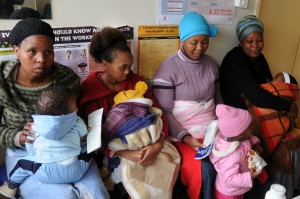
USAID's Infant & Young Child Nutrition Project
South Africa
 South Africa’s HIV burden is one of the greatest in the world. From 2009 to 2011, the US Agency for International Development’s (USAID) Infant & Young Child Nutrition (IYCN) Project worked to prevent HIV from reaching the next generation and to improve the nutritional status of mothers and children. The project informed a new set of national guidelines on infant and young child feeding within the context of HIV, and with national and international partners, identified opportunities for integrating nutritional assessment, counseling, and support services into programs focusing on prevention of mother-to-child transmission of HIV.
South Africa’s HIV burden is one of the greatest in the world. From 2009 to 2011, the US Agency for International Development’s (USAID) Infant & Young Child Nutrition (IYCN) Project worked to prevent HIV from reaching the next generation and to improve the nutritional status of mothers and children. The project informed a new set of national guidelines on infant and young child feeding within the context of HIV, and with national and international partners, identified opportunities for integrating nutritional assessment, counseling, and support services into programs focusing on prevention of mother-to-child transmission of HIV.
The project also worked in one district to mobilize communities and local government to integrate nutrition activities into community development plans. All of the project’s efforts contributed to strengthening programs that seek to improve the nutrition of infants and young children, pregnant and lactating women, and orphans and vulnerable children, particularly for populations at risk of contracting HIV.
Highlights
- As a member of the National Breastfeeding Committee, the IYCN Project played a key role in the country’s August 2011 move to promote an exclusive breastfeeding strategy for all mothers, including those who are HIV positive.
- The project helped develop a training package for lay counselors and community health workers and supported the training of 100 community health workers on infant and young child feeding.
- By adapting a regional, community-based planning tool for use locally, IYCN worked with Ward 86, Ekurhuleni Municipality, and a private-sector partner J&J Trust to conduct a pilot program that integrated nutrition into economic and community development planning. The community response was overwhelming, and community leaders included nutrition activities in their development plans.
Download a brief summarizing IYCN’s activities in South Africa.
IYCN resources
News archives
Learn more
Photo: Wendy Stone

